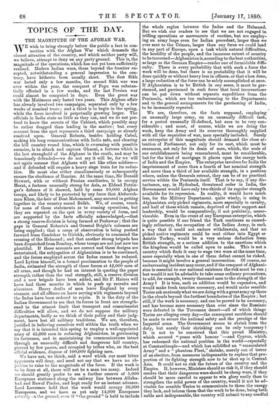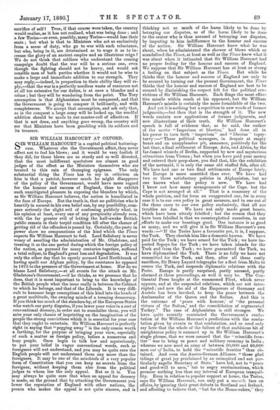TOPICS OF THE DAY.
THE MAGNITUDE OF THE AFGHAN WAR.
WE wish to bring strongly before the public a fact in con- nection with the Afghan War which demands the closest attention of the country, and which neither party will, we believe, attempt to deny on any party ground. This is, the magnitude of the operations, which has not yet been sufficiently realised. Modern Indian wars, those beyond the frontier ex- cepted, notwithstanding a general impression to the con- trary, have hitherto been usually short. The first Sikh war lasted only a few months, the second Sikh war was over within the year, the conquest of Pegu was substan- tially effected in a few weeks, and the last Persian war could almost be computed in days. Even the great war with the Mutineers only lasted two years. This Afghan affair has already involved two campaigns, separated only by a few weeks of nominal truce ; and a third is to begin in the spring, while the force involved is perpetually growing larger. The officials in India state as little as they can, and we do not pre- tend to know the secrets of the Cabinet, which possibly may be rather dragged than leading in the matter; but every account from the spot represents a third campaign as already resolved upon. General Roberts, besides holding Cabal, making his long communications with India safe, and clearing the hill country round him, which is swarming with possible enemies, is to attack and capture Ghazni, a fortress which is the last stronghold of the Afghans in the south, and may be tenaciously defended—we do not say it will be, for we will not again assume that Afghans will act like other soldiers— and if defended will require a heavy siege train for its reduc- tion. He must also either simultaneously or subsequently ensure the obedience of Bamian. At the same time, Sir Donald Stewart, with or without Persian auxiliaries, is to occupy Herat, a fortress unusually strong for Asia, as Eldred Pottin- ger's defence of it showed, held by some 10,000 Afghan troops, and likely to be protected by any force that Abdurrah- man Khan, the heir of Dost Mahommed, may succeed in getting together in the country round Balkh. We, of course, vouch for none of these statements as to coming operations, but they are repeated on the spot in " every variety of form, and are supported by the facts officially acknowledged,—that a strong reserve division is being formed at Peshawar ; that the gaps in General Roberts's and General Bright's columns are being supplied ; that a corps of observation is being pushed forward from Candahar to Girishk, obviously to command the crossing of the Helmund ; and that another strong brigade has been dispatched from Bombay, where troops are not just now too plentiful. If these accounts are correct and these designs are entertained, the subjugation of Afghanistan is to be continued, and the forces employed across the Indus cannot be reduced. Lord Lytton himself, in a formal proclamation to the people of India, estimated the strength of these forces at 42,000 men of all arms, and though he had an interest in quoting the paper strength rather than the real strength, still, a reserve division and a new brigade have been added, and Sir F. Haines will have had three months in which to push up recruits and absentees. Heavy drafts of men leave England by every steamer, and all officers on leave serving with regiments beyond the Indus have been ordered to rejoin. It is the duty of the Indian Government to see that its forces in front are strength- ened to the utmost limit that transport and commissariat difficulties will allow, and we do • not suppose the military departments, badly as we think of their policy and their judg- ment, have lost all military traditions. We are, therefore, justified in believing ourselves well within the truth when we say that it is intended this spring to employ a well-appointed army of 45,000 men in reducing Afghanistan, in garrisoning its fortresses, and in maintaining its communications intact through an unusually difficult and dangerous hill country, pierced by few passes, and occupied by tribes who, on the best official evidence, dispose of 100,000 fighting men. We have not, we think, said a word which our most bitter opponents will deny, and need not say that we have no ob- jection to raise to the magnitude of the force. If the work is to be done at all, there will not be a man too many. Indeed we should greatly prefer to see a further reserve of 5,000 Europeans stationed along the railway line between Allaha- bad and Rawul Pindee, and kept ready for an instant advance. Lord Lawrence held that the work would occupy 30,000 Europeans, and we have as yet only 14,000 Europeans actually c n the ground, even if "the ground" is held to include the whole region between the Indus and the Helmand. But we wish our readers to see that we are not engaged in trifling operations or movements of routine, but are employ- ing an army large even for Indian precedent, larger than we- ever sent to the Crimea, larger than any force we could land in any part of Europe, upon a task which natural difficulties, the hostility of the people, and the immense extent of country to be traversed—Afghanistan is, according to the best authorities, as large as the German Empire—render one of formidable diffi- culty. There is every probability that with such a force the work will be done, but there is no probability that it will be done quickly or without heavy loss in officers, or that when done,. a large reduction of the force can be safely accomplished at once. If Afghanistan is to be British in any sense, it must be gar- risoned, and garrisoned in such force that local insurrections can be put down without separate expeditions from the- Peninsula, which are too embarrassing to the Departments and to the general arrangements for the garrisoning of India, to be incessantly repeated.
We are, therefore, on the facts supposed, employing- an unusually large army, on an unusually difficult task, for a period unusually ill-defined, but sure to be very con- siderable ; and must, of course, while we are doing the- work, keep the Army and its reserves thoroughly supplied with all the requisites of war, men specially included. Surely- an enterprise of this magnitude should demand the close at- tention of Parliament, not only for its cost, which must be- enormous, not only for its drain of men, which, the scale of our establishments being remembered, must be considerable, but for the kind of mortgage it places upon the energy both. of India and the Empire. The enterprise involves for India the imprisonment of more than a fourth of her nominal strength and more than a third of her available strength, in a position• where, unless the Generals retreat, they can be of no practical service within the Peninsula itself. That is to say, if any dis- turbance, say, in Hydrabad, threatened order in India, the Government would have only two-thirds of its regular strength. available for its repression. In reality, it would have much less, for the Military Department, quite wisely, is using in. Afghanistan only picked regiments, more especially in cavalry, and half of those which remain, deprived of their support and leadership, would be comparatively, if not positively, unser- viceable. Even in the event of any European enterprise, which is quite possible if our friend the Turk continues so exceed- ingly refractory, the occupation of the Indian Army, in such_ a way that it could not endure withdrawals, and that no, picked native regiments could be sent either into Egypt or Asiatic Turkey, would be a very serious deduction from. British strength, or a serious addition to the exertions which the kingdom would be called upon to make. This is not a country which finds it easy to wage two wars at the same time, more especially when in one of them defeat cannot be risked, because it might involve a general insurrection. Of course, no embarrassing incident may occur, and if the conquest of Afghani- stan is essential to our national existence the risk must be run but would it not be advisable to take some ordinary precautions, to add, for example, twenty thousand men to the strength of the Army ? It is true, such an addition would be expensive, and` would make fresh taxation necessary, and would make sensible Tories ask anxiouslywhat we are doing with a great army up there in the clouds beyond the furthest boundaries of the Empire ; but still, if the work is necessary, and can be proved to be necessary, and has become more necessary than ever since the Russians were defeated in the Turcoman desert—all of which things Tories are alleging every day—the consequent sacrifices should' be made to secure the national safety and the prestige of the- Imperial arms. The Government seems to shrink from the duty, but surely their shrinking can be only temporary ? It is not to be conceived that this proud Ministry, which secured " peace with honour "—and Cyprus, which has redeemed the national position in the world—especially at Constantinople—and which has solidified an " emasculated Army" and a " phantom Fleet," shrinks, merely out of terror of an election, from measures indispensable to replace that pro- portion of its fighting strength now to be shut up in Central Asia. It could not so risk the future of the country and the- Empire. If, however, Ministers should so risk it, if they should resolve that their dangerous wars should be cheap wars, if they should be more careful to appear to win glory easily than to strengthen the solid power of the country, would it not be ad- visable for sensible Tories to communicate to them the energy they lack, and inform them that the work to be done, being both noble and indispensable, the country will submit to any needful sacrifice of self ? True, if that course were taken, the country would realise, as it has not realised, what was being done ; and a few Tories—or even, possibly, many Tories—would lose their seats ; but what is that to Ministers who act so exclusively from a sense of duty, who go to war with such reluctance, but who, being in it, are determined so to wage it as to in- crease the glory of an ancient empire and an illustrious reign We do not think that soldiers who understand the coming campaign doubt that the war will be a serious one, even though the fighting should not be heavy, and would ask sensible men of both parties whether it would not be wise to make a large and immediate addition to our strength. They may reply,—indeed, in proportion to their ability they will re- ply,—that the war is a perfectly needless waste of resources not at all too extensive for our duties, is at once a blunder and a crime ; but they will be wandering from the point. The Tory assumption is that Afghanistan must be conquered, and that the Government is going to conquer it brilliantly, and with completeness. We accept that assumption, and ask only that, as in the conquest a large army will be locked up, the needful addition should be made to our muster-roll of effectives. If that is not done, and anything goes wrong, the country will see that Ministers have been gambling with its soldiers and its treasure.



































 Previous page
Previous page